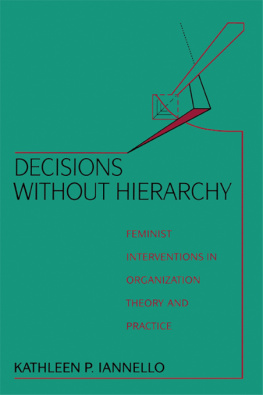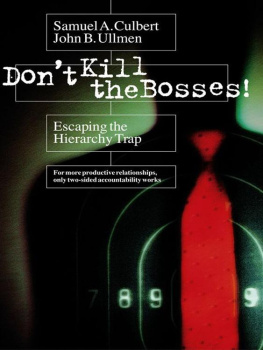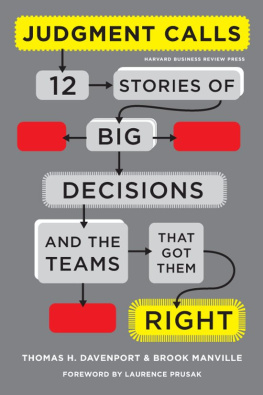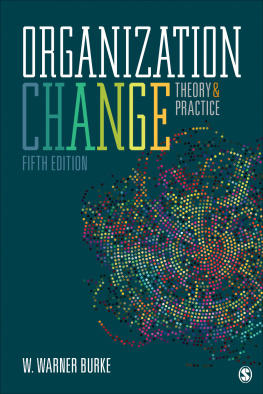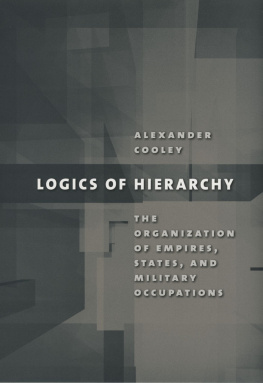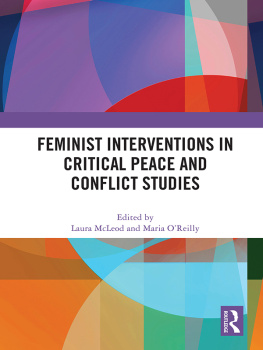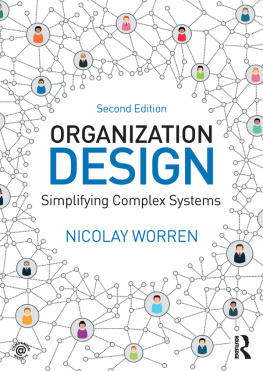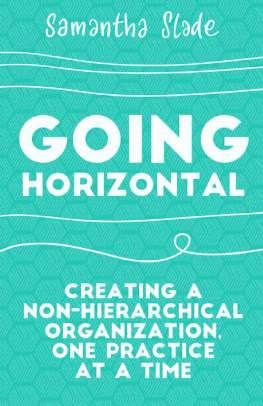DECISIONS WITHOUT HIERARCHY
DECISIONS WITHOUT HIERARCHY
FEMINIST INTERVENTIONS IN ORGANIZATION THEORY AND PRACTICE
KATHLEEN P. IANNELLO
Published in 1992 by
Routledge
Taylor & Francis Group
711 Third Avenue
New York, NY 10017
Published in Great Britain by
Routledge
Taylor & Francis Group
2 Park Square, Milton Park
Abingdon, Oxon OX14 4RN
Routledge is an imprint of the Taylor & Francis Group, an informa business
Copyright 1992 by Routledge, Chapman and Hall, Inc.
All rights reserved. No part of this book may be reprinted or reproduced or utilized in any form or by any electronic, mechanical or other means, now known or hereafter invented, including photocopying and recording, or in any information storage or retrieval system, without permission in writing from the publishers.
Library of Congress Cataloging in Publication Data
Iannello, Kathleen P., 1954
Decisions without hierarchy : feminist interventions in organization theory and practice / Kathleen P. Iannello.
p. cm.
Includes bibliographical references and index.
ISBN 0-415-90428-5 ISBN 0-415-90429-3
1. Organizational sociologyUnited States. 2. Feminist theory. 3. Decision-makingUnited StatesCase Studies. I. Title.
HM131.1284 1992
British Library cataloguing in publication data also available
I would like to dedicate this book to the memory of Dr. Frank Sim, whose insights and thorough knowledge of organizations guided my work beyond his death in 1985.
Contents
Acknowledgments
I would like to thank the multitude of people who helped bring this project to completion. Foremost among them are the women of the peace group, health collective, and business group who allowed a stranger to observe meetings as well as consume their time with unending questions.
Next, a special thanks goes to family members who provided the necessary at-home support. First among them is my spouse, Terry Dalton, assisted by our sons, Brendan and Trevin Dalton, as well as a coalition of other Daltons and Iannellos.
Another round of thanks goes to Robert Friedman, Jim Eisenstein, Larry Spence, Marylee Taylor, and Nancy Love of Penn State for their advice with the first draft of this document. Encouragement in the revision process came from many of my former colleagues at Dartmouth College, particularly Lynn Mather, Frank Smallwood, and Dick Winters, my Dartmouth students, and John P. Burke at the University of Vermont.
I am indebted to many at Gettysburg College for their support of this project. Jean Potuchek, Liliane Floge, and the women of the feminist research discussion group contributed insightful comments and always kept their doors open for impromptu consultation. Jamee Conover, Sue Welch, and my student assistant, Keith Stirewalt, did a first-rate job on the editing of the manuscript. I am also grateful to my colleagues in Political Science for their continual encouragement and also for the financial support provided by my department and the Gettysburg College Research and Professional Development Fund.
Further, I would like to thank Pam Regis of Western Maryland College for suggesting the title of the book; Ginny Story for the index; the editors at Routledge for their interest and guidance; Hester Eisenstein for the inspiration and direction her work has provided; and Wendy Sarvasy for starting it all.
Preface
Decisions Without Hierarchy is part of a growing literature that assesses the contributions of feminism over the past twenty yearsa literature some call the study of feminist interventions.1 Specifically, this study intends to address, from a feminist perspective, a series of questions regarding decision making and organization structure. For example, why do we assume decision making must be hierarchical? Under what circumstances can non-hierarchy be maintained? What are the benefits and costs that result from non-hierarchical process? And what are its possible applications?
of this book explores feminist interventions in organization theory by considering the starting points of organization theory and feminist theory, as well as the points at which their lines of inquiry converge. For example, organization theory begins from the world as it is, a world in which hierarchies organize all aspects of life. It does not ask whether hierarchies should exist, but simply how they can be run more smoothly. Feminist theory, on the other hand, begins from the world as it ought to be, one in which gender hierarchies have been eliminated; thus, it assumes the possibility for fundamental social change.
explores feminist interventions in organization practice. Included are three case studies of feminist organizations in a small New England city. These studies provide examples of feminist practice that yield what can be termed modified consensus.
Modified consensus is both a method of decision making and a form of organization. It is not, as many would assume, a form of consensual structure that has inevitably given in to hierarchy. Instead, modified consensus falls outside such categorizations and contributes to new understandings about the ways in which non-hierarchical structure works.
While retaining the practice and spirit of consensual process, modified consensus at the same time efficiently meets internal and external environmental demands placed on organizations. This is path-breaking, because the concepts of consensus and efficiency have not often been viewed as compatible. Decision by consensus means that all members of an organization have the opportunity to discuss matters of policy until a decision acceptable to everyone is reached. It is this process of discussion, delay, and non-voting that has led to charges of inefficiency.
Modified consensus responds to the problem of efficiency through outward (not downward) delegation of routine decisions to those in the organization with particular skill and knowledge in what all members of the organization determine to be routine areas. But critical decisions, those that determine the overall path and goals, are retained for the entire membership and are arrived at consensually. This is very different from decision making in hierarchies, in which critical decisions are made by the few at the top of the organization. It is thus with the role of hierarchy in organizations that this study begins.
NOTES
. See Hester Eisenstein, Gender Shock (Boston: Beacon, 1991), and also Sophie Watson ed., Playing the State: Australian Feminist Interventions (Verso and Sydney: Allen & Unwin, 1990).
PART ONE
ONE
The Starting Point of Organization Theory
Whether public or private, government or family, school or church, organizations have a significant influence on everything we do. The development of organizations is the principle mechanism by which, in a highly differentiated society, it is possible to get things done, to achieve goals beyond the reach of the individual.1 Because of this, the study of organizations in society has received much attention. From the philosophers of ancient Greece to the corporate heads of the twentieth century, the question of how to organize in order to achieve specific goals and purposes has provoked interest.
Within the body of modern literature that has come to be known as organization theory, many studies have had great impact on our views of the organizations around us. Theorists such as Frederick Taylor, Elton Mayo, Chester Barnard, and Robert Merton, to name a few, conducted the early studies, which tended to focus on the structure and function of organizations. Perhaps none had so great an impact as the German sociologist Robert Michels, who was among the first to focus on the growth of public bureaucracy.

